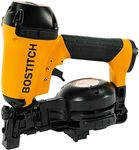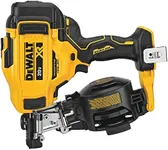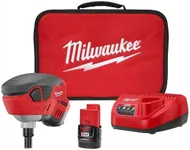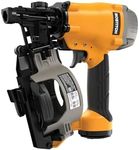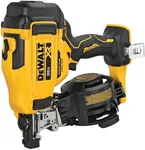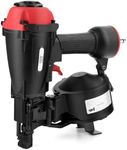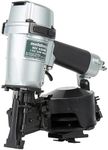Buying Guide for the Best Roofing Nailers
Choosing the right roofing nailer is crucial for ensuring that your roofing project is completed efficiently and effectively. A roofing nailer is a specialized tool designed to drive nails into roofing materials, and selecting the right one can make a significant difference in your work quality and speed. When picking a roofing nailer, consider the following key specifications to ensure you get the best fit for your needs.Type of Roofing NailerThere are two main types of roofing nailers: coil roofing nailers and stick roofing nailers. Coil roofing nailers use a coil of nails, which allows for a larger capacity and fewer reloads, making them ideal for larger projects. Stick roofing nailers use a strip of nails and are generally lighter and easier to handle, making them suitable for smaller projects or for users who prioritize maneuverability. Choose a coil nailer for extensive roofing jobs and a stick nailer for smaller, more detailed work.
Nail CapacityNail capacity refers to the number of nails the nailer can hold at one time. A higher capacity means fewer reloads, which can save time and increase efficiency, especially on larger projects. Nail capacities can range from around 60 to over 300 nails. For large-scale roofing projects, a higher capacity nailer is beneficial, while for smaller tasks, a lower capacity may suffice and can be easier to manage.
Nail Size CompatibilityRoofing nailers are designed to work with specific nail sizes, typically ranging from 3/4 inch to 1-3/4 inches. The size of the nails you need will depend on the roofing material and the specific requirements of your project. Ensure the nailer you choose is compatible with the nail sizes you plan to use. For general roofing tasks, a nailer that supports a range of common sizes is ideal.
WeightThe weight of the roofing nailer can impact your comfort and ease of use, especially during extended periods of work. Roofing nailers can weigh anywhere from around 4 to 6 pounds. Lighter nailers are easier to handle and reduce fatigue, making them suitable for longer projects. However, heavier nailers may offer more durability and stability. Consider your physical strength and the duration of your projects when choosing the weight of your nailer.
Depth AdjustmentDepth adjustment allows you to control how deep the nails are driven into the roofing material. This feature is important for ensuring that nails are properly seated without damaging the material. Roofing nailers with tool-free depth adjustment are more convenient and allow for quick changes on the fly. If you work with various materials or need precise control over nail depth, look for a nailer with easy and accurate depth adjustment.
ErgonomicsErgonomics refers to the design of the nailer in terms of user comfort and ease of use. Features such as a comfortable grip, balanced weight distribution, and reduced recoil can make a significant difference in user experience. An ergonomic design is particularly important if you will be using the nailer for extended periods. Test the nailer if possible to ensure it feels comfortable and manageable in your hands.
DurabilityDurability is a key factor, especially for professional use or frequent projects. Roofing nailers made from high-quality materials such as magnesium or aluminum are typically more durable and can withstand the rigors of heavy use. Consider the build quality and the reputation of the brand for producing reliable tools. A durable nailer will provide long-term value and reduce the need for frequent replacements.
